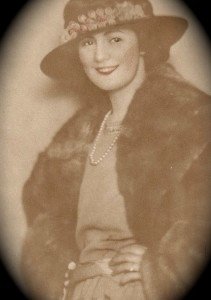
On Saint Patrick’s Day, as my son’s name is Patrick, I decided to honor his grandmother, my mother-in-law, whom I loved most dearly. I wrote this essay for her when she was 102. When time came for her to accept that her only son would choose a black girl as his wife, I never heard any negative comments. Florita accepted me and Patrick fully and unconditionally into the fold of her family. And that was remarkable in the 1970’s upstate New York.
~ ~ Florita ~ ~
When your parents named you Florita, they must have sensed - as expectant parents of a child sometimes do - that you would be cheerful and beautiful like a little flower. You were that, and graceful, intelligent and humorous, and highly artistic. Florita was the perfect name for you.
Last October we celebrated your 102nd birthday. You were one of the last children born in the 19th century, you lived through the 20th and will die in the 21st. When you stumbled into my arms 33 years ago I could not have imagined that so many years hence I should still know you, much less would it have crossed my mind then, that we would one day feel so tenderly toward each other.
I look at you and marvel at the endurance of your body - grown frail in time - that still obeys your active mind’s unequivocal command to stay alive. Your snow-white hair, complemented in the pastel colors of your clothes, is soft and silky like a baby’s; your velvet, alabaster skin belies your age. Years ago, you tearfully claimed you could no longer see, as you picked a hair off your blouse. And, years ago, too, after fussing with a hearing aid, you tossed it in the drawer where it has stayed.
You are my mother-in-law but I call you Mother, and I don’t remember why or when I chose to do so. You did not give me life, and I did not grow up in your care. That is important, for our love for each other has avoided collapsing into patterns of controlling familiarity. Once you knew I was part of your family, you accepted, and folded me with grace and care into its fabric. And Patrick, the youngest of your grandchildren, is there to brighten your later days.
I’ve listened with pleasure to stories of your childhood and the family rituals that unfolded in your comfortable New England home. I heard tales of tenuous sibling relationships, of your father’s musicianship, and his hand in derailing your budding operatic career. You would have sung for kings, had he allowed it. And I learned of your anguish at having to accept the truth about your handsome physician husband: he was an alcoholic who caused much pain in your marriage. I smiled that Fred as a child slept with his St. Bernard and fed him, before eating himself. So many years later, he still feeds his pet first. And I have grown to appreciate your deeply personal relationship with your Catholic God. “The road to hell,” you say, “is paved with the skulls of priests.” You are not fooled by the deceptions of the Church.
It was summer 1970, when we first met. Fred and I had recently moved into a penthouse apartment in a turn-of-the-century four storey house on Via Pompeo Magno in Rome; we lived a stone’s throw from Vatican City. From the front terrace, St. Peter’s dome towered to the right; to the left, in the distance, stood the medieval Castello Sant’ Angelo. We lived a block from the Tiber, two from the bridge connecting to the Piazza del Popolo.
I was waiting when you arrived. It was mid morning. Fred spoke through the intercom, and moments later the elevator door - in our foyer - opened, and Fred said: “This is Catana, mother.” You took one step and stumbled, and would have fallen, had I not been there to hold you. Your son had not seen it necessary to mention to you that I was black.
We were dining on the terrace when the telephone rang and Fred’s agent called offering him a fortnight’s work in Vienna. To both our dismay, he accepted, and a day after your arrival entertaining you in Rome became my responsibility.
When I booked a tour of Christian history - the catacombs, medieval churches, Renaissance cathedrals, Baroque basilicas - it had been my intention to delight your Roman Catholic heart. But, after the fourth stop, you bade me to go ahead without you. ”As far as I’m concerned,” you said, “you’ve seen one church, you’ve seen them all.” That was it. You were content to see Rome’s 4000 year-old religious history from the window of an American Express tour bus.
I took you to the Sistine Chapel, the Spanish Steps, the Colosseum, Trastevere, the Pantheon, two Palazzi… Villa Borghese. On Via Condotti you bought silk scarves and leather hand bags for your daughters; Jourdan shoes for yourself. After tossing a handful of lire into the Trevi fountain you enjoyed a cappuccino on the Piazza Navona.
Fred returned five days prior to your departure. It was time you were alone. I’d had enough. I moved into my friend’s pensione on Via dei Gracchi, and understood that the relationship with your son was fragile and easily strained.
You were quiet and demure in Rome. Not so when you returned to New York. There, you had much to say. You knew - better than I - that if there was a girl who could latch onto your son, he had found her. “All the others,” you reported to your daughters, “wanted to marry him; this one doesn’t. And she’ll get him yet, for she is doing everything right!”
Does this remind you perhaps of someone ripe in years, who you loved dearly and who through her grace taught you lessons only the wisdom of years can impart? I’d love to hear form you?
MAR

